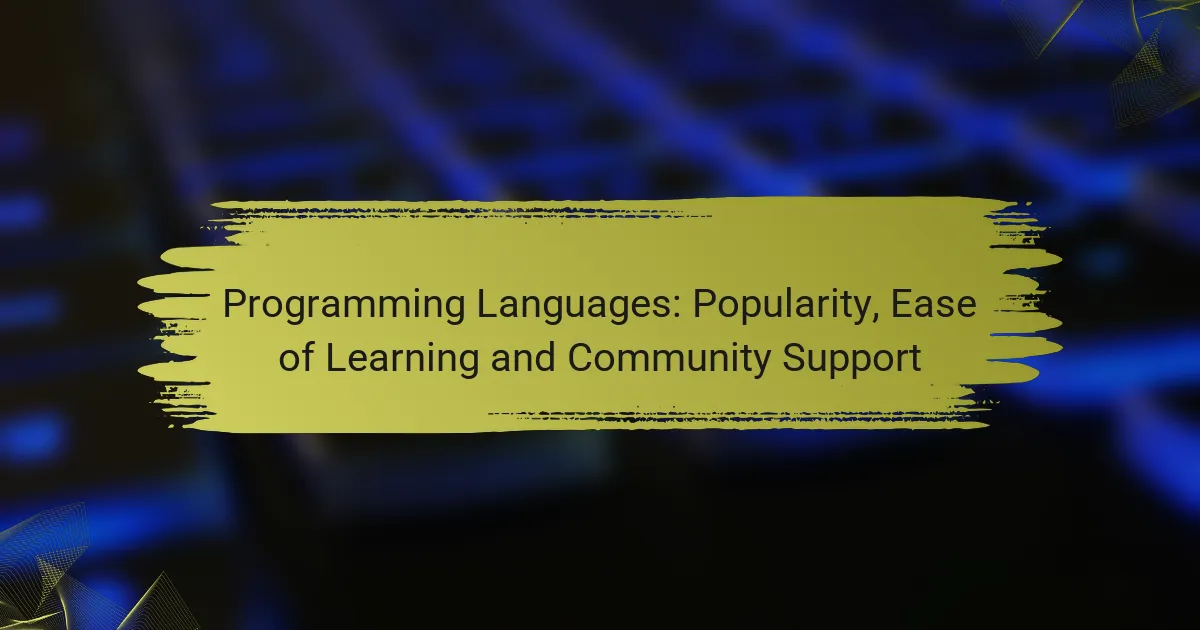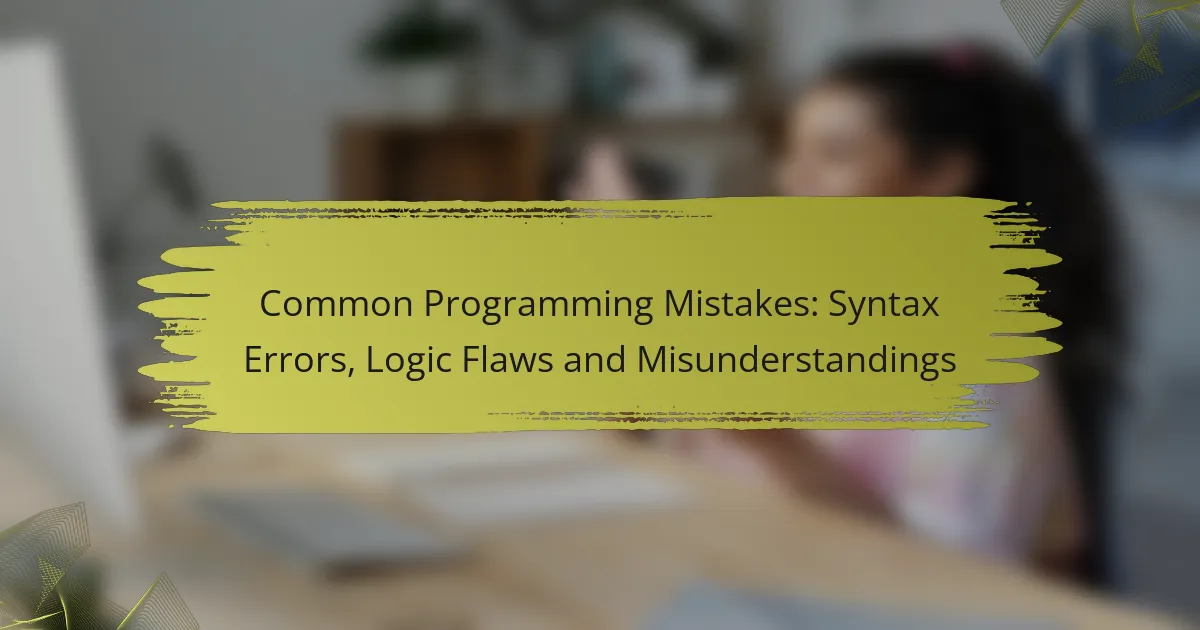In 2023, programming languages such as JavaScript, Python, Java, C#, and PHP stand out for their popularity due to their versatility and ease of learning. The simplicity of syntax, along with strong community support, plays a crucial role in helping learners quickly grasp these languages, making them suitable for a wide range of applications. A vibrant community not only provides valuable resources but also fosters collaboration, enhancing the overall development experience.

Which programming languages are the most popular in 2023?
In 2023, the most popular programming languages include JavaScript, Python, Java, C#, and PHP. These languages are favored for their versatility, ease of learning, and robust community support, making them ideal for various applications from web development to data science.
JavaScript
JavaScript remains a dominant language, especially for web development. It enables interactive web pages and is essential for front-end frameworks like React and Angular.
With a vast ecosystem of libraries and frameworks, JavaScript allows developers to create dynamic applications efficiently. Its asynchronous capabilities, like Promises and async/await, enhance performance in web applications.
Python
Python is widely recognized for its simplicity and readability, making it an excellent choice for beginners. Its syntax is straightforward, which helps new programmers grasp concepts quickly.
Python’s extensive libraries, such as NumPy and Pandas, support data analysis and machine learning, making it a favorite in scientific computing. Its community is active and supportive, providing numerous resources for learners.
Java
Java is a robust, object-oriented language known for its portability across platforms due to the Java Virtual Machine (JVM). It is commonly used in enterprise applications and Android development.
Java’s strong typing and extensive documentation make it suitable for large-scale systems. However, its verbosity can be a drawback for some developers compared to more concise languages like Python.
C#
C# is a versatile language developed by Microsoft, primarily used for Windows application development and game development with Unity. Its syntax is similar to Java, making it accessible for those familiar with object-oriented programming.
The language benefits from strong community support and integration with the .NET framework, which provides a rich set of libraries for various applications. C# is also increasingly used for web development with ASP.NET.
PHP
PHP is a server-side scripting language widely used for web development. It powers many content management systems, including WordPress, making it a staple for building dynamic websites.
While PHP has faced criticism for its security issues, recent versions have improved performance and introduced modern programming features. Its large community offers extensive resources, making it easier for developers to find support and tutorials.

What factors contribute to the ease of learning programming languages?
The ease of learning programming languages is influenced by several key factors, including the simplicity of syntax, the availability of resources, and community support. These elements can significantly affect how quickly and effectively a learner can grasp a new language.
Simplicity of syntax
A programming language with a simple syntax is generally easier for beginners to learn. Languages like Python are known for their clear and readable syntax, which allows new programmers to focus on problem-solving rather than getting bogged down by complex rules.
When evaluating a language’s syntax, consider how closely it resembles natural language or other familiar languages. For example, languages that use fewer symbols and keywords can reduce the learning curve significantly.
Availability of resources
The availability of learning resources, such as tutorials, documentation, and online courses, plays a crucial role in how easily someone can learn a programming language. Languages with extensive resources, like JavaScript and Python, provide learners with a wealth of information to draw from.
Look for platforms that offer structured courses, interactive coding environments, and community forums. Websites like Codecademy, freeCodeCamp, and Coursera can be invaluable for beginners seeking guidance.
Community support
A strong community can greatly enhance the learning experience for new programmers. Communities provide support through forums, social media groups, and local meetups, where learners can ask questions and share knowledge.
When choosing a programming language, consider the size and activity level of its community. Languages with large communities, such as Java or C#, often have more readily available help and resources, making it easier for learners to overcome challenges.

How does community support impact programming language choice?
Community support significantly influences the choice of programming languages by providing resources and assistance that enhance learning and development. A strong community fosters collaboration, offers access to valuable tools, and helps troubleshoot issues, making it easier for developers to adopt and excel in a language.
Access to forums and tutorials
Access to forums and tutorials is crucial for developers learning a new programming language. These platforms allow users to ask questions, share knowledge, and find solutions to common problems. Popular languages like Python and JavaScript have extensive online communities, with numerous tutorials available for free, which can accelerate the learning process.
When choosing a language, consider the availability of resources on platforms like Stack Overflow, Reddit, or dedicated forums. Look for languages with active discussions and a wealth of tutorials, as this can significantly ease the learning curve and provide ongoing support.
Availability of libraries and frameworks
The availability of libraries and frameworks can greatly enhance a programming language’s usability and efficiency. A rich ecosystem allows developers to leverage pre-built solutions for common tasks, reducing the time and effort needed to build applications from scratch. For instance, languages like Ruby and JavaScript offer extensive libraries that simplify web development.
When evaluating a programming language, assess the number and quality of libraries and frameworks available. A language with a strong library ecosystem can save development time and improve project outcomes, making it a more attractive choice for both beginners and experienced developers.

What are the best resources for learning programming languages?
Some of the best resources for learning programming languages include interactive platforms and online courses that cater to various skill levels. These resources often provide structured learning paths, community support, and practical exercises to enhance coding skills.
Codecademy
Codecademy is an interactive platform that offers coding courses in multiple programming languages, including Python, JavaScript, and Ruby. It provides a hands-on approach, allowing learners to write code directly in their browser, which is beneficial for immediate practice.
Consider starting with their free courses to gauge your interest before committing to a paid subscription for more advanced content. Codecademy also offers projects and quizzes to reinforce learning, making it a practical choice for beginners.
Coursera
Coursera partners with universities and organizations to offer a wide range of programming courses. These courses often include video lectures, peer-reviewed assignments, and community forums, providing a comprehensive learning experience.
Many courses are free to audit, but obtaining a certificate requires a fee. Look for courses from reputable institutions to ensure quality content. Coursera’s flexibility allows you to learn at your own pace, which is ideal for busy schedules.
edX
edX is another platform that collaborates with top universities to deliver high-quality programming courses. It offers a mix of free and paid options, with courses covering everything from basic programming to advanced topics like data science and artificial intelligence.
Students can earn verified certificates for a fee, which can be beneficial for career advancement. The platform’s rigorous academic standards ensure that learners receive valuable knowledge and skills applicable in the tech industry.
FreeCodeCamp
FreeCodeCamp is a nonprofit organization that provides a free, self-paced coding curriculum. It focuses on web development and includes hands-on projects that help learners build real-world applications.
The community support is robust, with forums and chat groups where learners can ask questions and share knowledge. Completing the curriculum can also lead to certifications, making it a great option for those looking to enter the tech field without financial investment.

How do programming languages compare in terms of job market demand?
Programming languages vary significantly in job market demand, influenced by industry trends and technological advancements. Currently, languages like Python and Java are highly sought after, reflecting their widespread use in various sectors.
High demand for Python developers
Python has surged in popularity due to its versatility and ease of use, making it a top choice for data science, web development, and automation. Many companies are looking for Python developers, particularly in sectors like finance, healthcare, and technology.
As a result, job postings for Python developers often outnumber those for other languages, with salaries typically ranging from $70,000 to $120,000 annually in the United States. This demand is driven by the language’s strong community support and a wealth of libraries that simplify complex tasks.
Java remains a staple in enterprise
Java continues to be a cornerstone in enterprise environments, particularly for large-scale applications and backend systems. Its stability and scalability make it a preferred choice for businesses that require robust and secure solutions.
Java developers can expect steady demand, especially in industries like banking and telecommunications. Salaries for Java positions generally range from $80,000 to $130,000 per year, reflecting the language’s critical role in enterprise software development.



